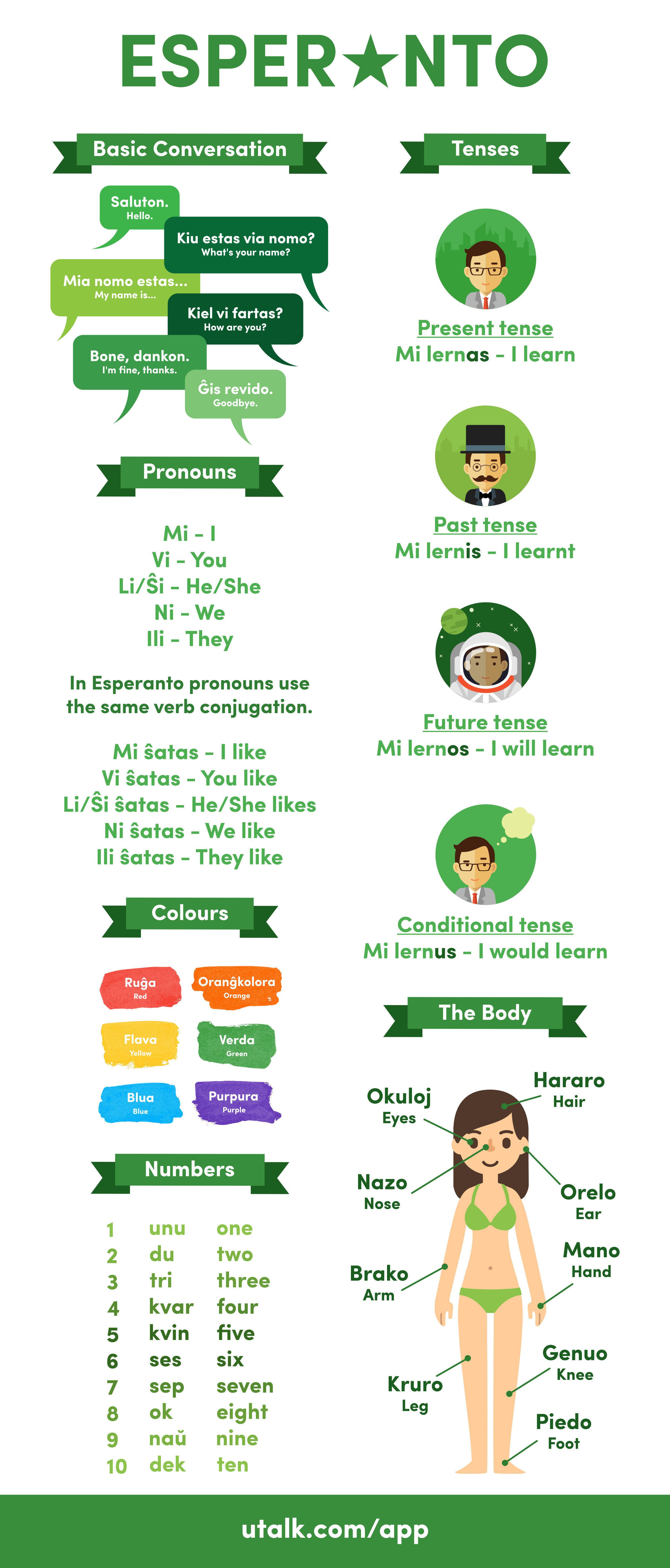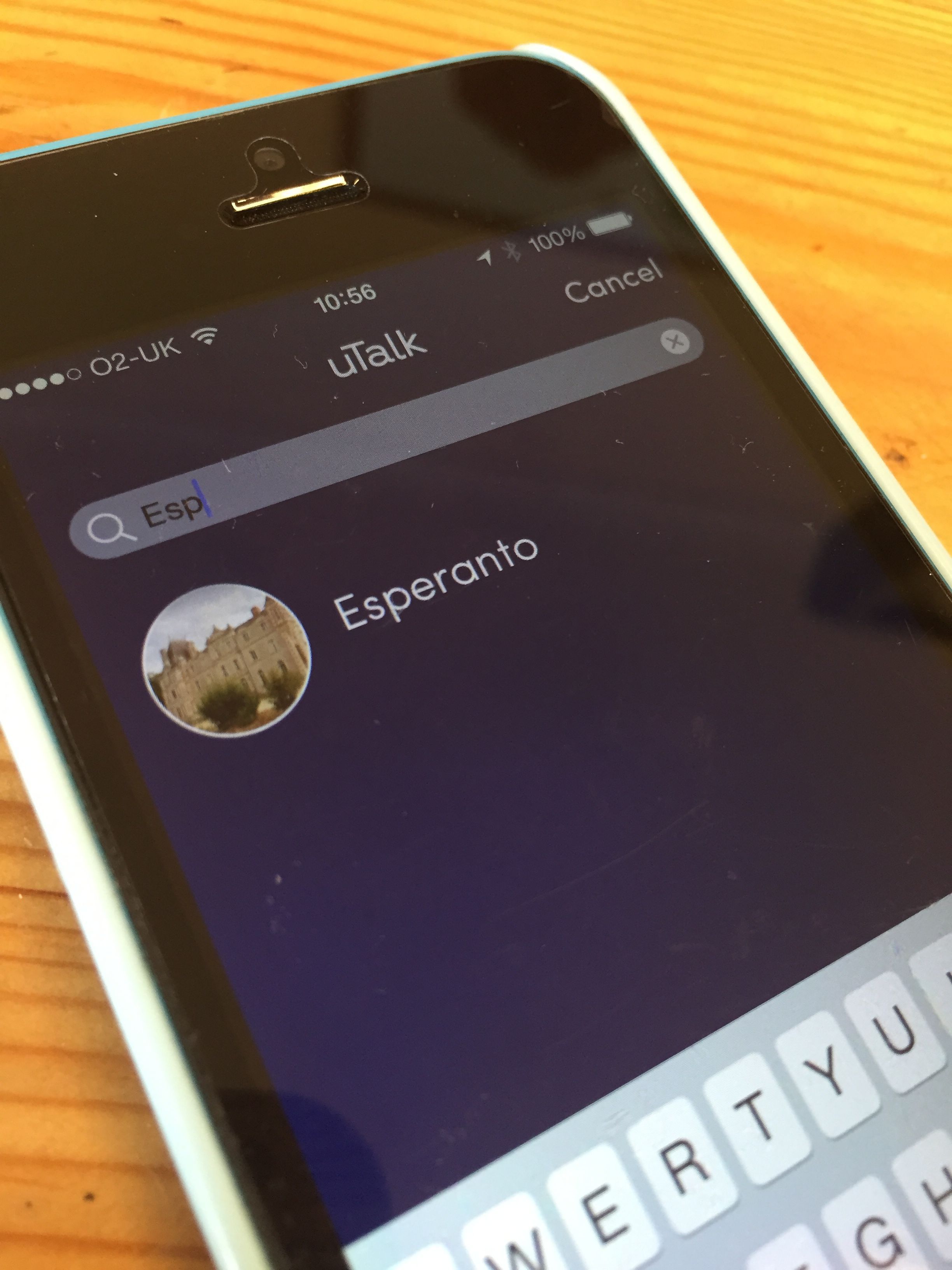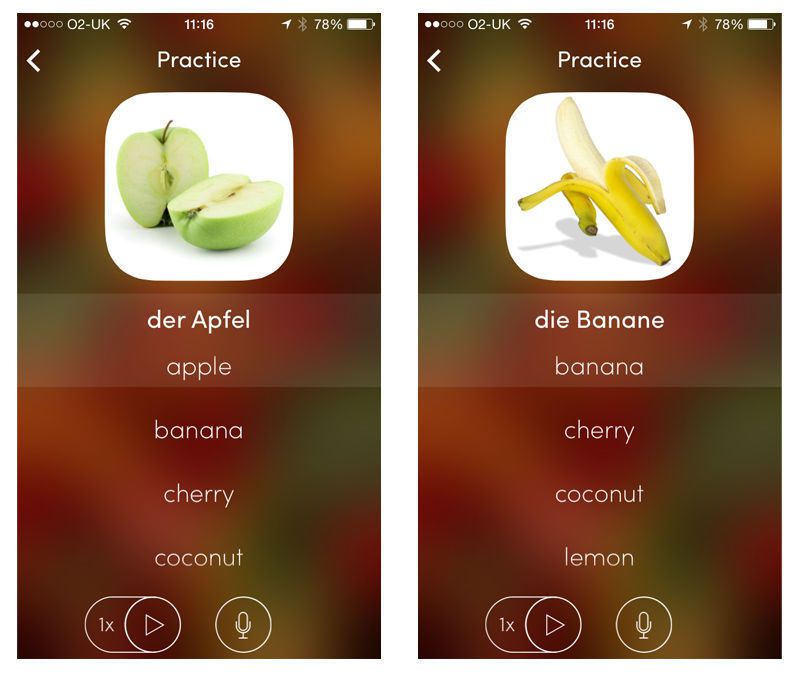A beginner’s guide to Esperanto
We hope you’ve enjoyed our Esperanto week! If we’ve convinced you to give the language a try, you might find this handy beginner’s guide a good place to start… Please feel free to share it with anyone you think might be interested.
And for more information about Esperanto, visit edukado.net, a site run by linguist Katalin Kováts, who worked with us on the translation and recording of uTalk Esperanto.
Following a request, this guide is now also available in Spanish.
Embed This Image On Your Site (copy code below):
Why learn Esperanto?
Saluton! Mia nomo estas Nat, kaj mi lernas Esperanton.
Whilst others jet-set away to sunny beaches and tropical climes this summer, my plans are slightly more academic. I will be learning Esperanto. OK, I’ll take a break too, but I’m really excited about my summer goal, and I’m hoping to achieve it within two months.
What, Why, How?
All good questions. Let’s start with ‘What’.
What is Esperanto?
Esperanto is a language invented by Ludwig Zamenhof, whose idea was to create an international, apolitical language which is very, very (very) easy to learn. Since its creation in the 1880s, it’s seen surges and declines in popularity, and is currently spoken by up to two million speakers, and – quite amazingly – up to 2,000 native speakers. Esperantists place a heavy emphasis on how speaking and engaging with Esperanto makes people operate on an equal footing, and can open up communication opportunities all over the world.
Why learn Esperanto?
 So why learn it? Unlike with other languages, you don’t have the goal of going to the target country to finally try out some of your new Esperanto phrases. There is no Esperanto country, of course. But Esperantists tend to be incredibly friendly and welcoming to those who learn the language, making it easy to find conversation partners or groups, especially in the age of the internet. Esperantists even have their own ‘Passport Service’, by which travelling Esperantists can find locals who are willing to open their houses up to fellow speakers, making it easy to travel abroad and widen your Esperantist community.
So why learn it? Unlike with other languages, you don’t have the goal of going to the target country to finally try out some of your new Esperanto phrases. There is no Esperanto country, of course. But Esperantists tend to be incredibly friendly and welcoming to those who learn the language, making it easy to find conversation partners or groups, especially in the age of the internet. Esperantists even have their own ‘Passport Service’, by which travelling Esperantists can find locals who are willing to open their houses up to fellow speakers, making it easy to travel abroad and widen your Esperantist community.
Personally, I’m mostly in it out of fascination. I’ve heard how easy it is to learn and I want to see for myself how much I can achieve in two months. During our uTalk Esperanto recording, I picked up a couple of the basics and they’ve stuck with me, which has encouraged me to think that I might be able to pick up a lot more fairly quickly.
I’m also interested in the application of Esperanto, beyond just learning it for personal enjoyment. Because the language is so simple (just 16 grammar rules!) and completely regular (yes, completely!), it can be effectively used as a bridge language between communities who otherwise might struggle to communicate. It’s also been trialled extensively in primary schools, where the logic goes that teaching Esperanto enables children to get to a very high language standard very quickly, so that they can start being creative in a foreign language early on. They can then transfer the skills over to other languages they study later: effectively, they have not just learnt Esperanto, but learnt how to learn a language. And done it without the chronic frustration of trying to remember how the irregular past participle should be formed, which taints most people’s memories of school-day French and makes them feel, even as adults, that they ‘cannot’ learn a language. Instead, children can chatter away with relative fluency, experiencing the liberation of communicating in another tongue at a really young age. To learn more, watch this video:
I also like the sound of it. To me, Esperanto has a slightly Eastern European tinge, with a mish-mash of vocabulary which I can sometimes recognise from other languages. Already, as an English speaker, I am familiar with the following basic words:
Jes (Yes)
trajno (train)
Mi lernas (I learn)
boato (boat)
fiŝo (fish)
And from other languages, I recognise:
Dankon (Thanks)
fermita (closed)
ombro (shade)
glacio (ice)
Where am I starting from?
I’m a total beginner: I haven’t ever picked up an Esperanto book, and I don’t own one. However, from my interaction with our Esperanto voiceover artists and translators, I have picked up a few things which in other languages would take me weeks of effort. So I feel like I’m starting from an advantage. What I know is this:
Adjectives
Always end in an -a. To form the opposite of the adjective, you just add ‘mal-‘ in front of it. So:
Granda – big
Malgranda – small
Fermita – closed
Malfermita – open
Vera – true
Malvera – false
Nouns
Always end in -o. Always! To form the feminine, you just add ‘-in-‘ before the final ‘o‘:
turisto – turistino
aktoro – aktorino
kantisto – kantistino
Verbs
‘mi‘ is ‘I’, ‘ŝi‘ is ‘she’, ‘li‘ is he’, ‘vi‘ is ‘you’, and present tense verbs always end in ‘-as‘. So:
Mi lernas – I learn
Li lernas – he learns
Vi lernas – you learn.
How will I learn?
By any means possible. Not coincidentally, uTalk Esperanto has just been released, and that’s going to help me hugely with pronunciation and vocabulary. I’ve also got Katalin Kováts’ Poŝamiko (‘Pocket friend’), a book to guide me on the basics, and then all of the resources listed at http://en.lernu.net/ – more than enough to keep me going for the next few months. After that, who knows – perhaps some conversation classes?
Wish me luck!
Nat
If you’d like to join Nat in learning Esperanto, download uTalk from the App Store to get started!
So you want to learn Spanish?
Starting to learn Spanish has been an amazing journey. So far, the language and the people are really interesting, and it’s nice to know that a large population of Americans can speak the language. After long hours of practice, I am sitting here writing a post, while listening to my favorite Spanish rap songs.
Spanish class helped me in some ways and has hurt my interest in others. This was due to the grammar, and also we weren’t actually speaking. As much as I love doing grammar workbooks and vocabulary quizzes, I was more interested in sounding like Don Juan seducing girls.
 Spanish is a great language and it has so many benefits, the first being that by speaking the language you can talk to a much larger portion of the world. Spain, Colombia, and Buenos Aires are filled with a lot of activities and people to talk to. Something that most people might not know is that, by speaking Spanish, you can also talk to older generation Filipinos and people from Israel, Greece, Turkey, Yugoslavia, and Bulgaria. On top of this, after Spanish, Portuguese can be acquired with half of the work already done.
Spanish is a great language and it has so many benefits, the first being that by speaking the language you can talk to a much larger portion of the world. Spain, Colombia, and Buenos Aires are filled with a lot of activities and people to talk to. Something that most people might not know is that, by speaking Spanish, you can also talk to older generation Filipinos and people from Israel, Greece, Turkey, Yugoslavia, and Bulgaria. On top of this, after Spanish, Portuguese can be acquired with half of the work already done.
I love the pronunciation for Spanish. You can be fairly understood without going through the work that a French student would go through. Of course, the hardest thing is rolling your ‘r’s, but don’t worry. It isn’t too serious and Spanish speakers can understand you without it. The pronunciation won’t take very long to master compared to other languages. That’s one of the benefits of Spanish.
After pronunciation comes vocabulary. This is easier than other languages due to the similarity of Spanish and English. We have a lot of cognates, like la sofa becomes ‘sofa’, or los pantalones becomes ‘pants’.
Spanish grammar isn’t really that bad, people make it seem a lot harder than it is. I’ve heard that Arabic, Hungarian, and Latin have intense grammar that makes Spanish look easy. That’s because Spanish is so similar to English. It only has a couple of additions, and most of the sentences can translate back to English and still sound comprehensible. One hard step is learning how to conjugate verbs. Past, Present, Future, Conditional, Imperfect, and the dreaded Subjunctive. All verbs have different forms that you must learn, but thankfully, most follow the same pattern. In a sense, it’s just more vocabulary disguised as grammar.
The hardest rule is differentiating between Subjunctive and Indicative forms. For example it stresses the ability to know the difference between the following sentences: We always eat after the class ends, and We are going to eat after the class ends. In Spanish, those sentences are different and it is up to you to memorize the difference along with the verb conjugations. Fun, right? Well it actually isn’t that hard. It just takes time to get the hang of it.
Spanish is an easy language for English speakers, however there is one harsh reality. Learning a language isn’t easy. It takes hours of work and practice, and sometimes we overestimate how hard it actually is. We create excuses for not learning the language. That is why it is important that you have the right motivation for learning a language. Knowing about the steps above will give you a heads up for Spanish, but if you don’t have the right motivation, you will set yourself up for failure. I have faith in your language learning experience. Use it wisely, young Padawan.
Ray Jones
Read more from Ray on his blog at themodernlingo.com.
—
Want to join the EuroTalk blogging team? We’re always keen to hear from language enthusiasts with something to share. Email liz@eurotalk.com for details.
Learning German: a whole new world
So as you may remember, I recently decided to try and learn some German as part of the uTalk language challenge. It’s not a language I’ve ever studied before, and as much as I’m enjoying getting stuck in, it’s also proving quite a bit trickier than I expected.
First, the accent is quite difficult to master. Up to now, my language studies have focused on the Romance languages, particularly Spanish, with its soft, rolling ‘r’ sound and lovely, lilting quality. German is, in contrast, full of hard ‘d’s and ‘ch’s and is a very throaty language, whereas Spanish trips easily off the tongue. There’s a video that surfaces from time to time on the internet, about how everything sounds angry when you say it in German. I don’t necessarily agree with that, but it’s certainly a very different accent to the languages I’ve studied before and is taking a bit of getting used to. I’m pretty sure I’ve been speaking German with a Spanish accent some of the time, which is confusing to say the least.
Then there are the long words. This is actually one of my favourite things about German – the way you can express almost anything simply by sticking words together – but it’s also quite daunting for a learner. Nowhere is this more evident that in the numbers, which look slightly terrifying on first encounter. That said, the way they’re constructed is actually very logical (67, for instance, is ‘seven and sixty’), so they’re not quite as scary as they look. So far, this is my particular favourite – it looks like a tongue twister but still makes complete sense when you break it down into five and fifty:
Telling the time, on the other hand, is proving a bit of a killer. The main reason for this is that German approaches telling the time differently to English. So whereas here in the UK we say ‘half four’ to mean ‘half past four’, in Germany it means ‘half of the fourth hour‘ – or ‘half past three‘. And it gets better – if you want to say ‘twenty five past three’, it translates in German as ‘five to half four’. I’m sure this is perfectly logical to a German speaker, and I know other languages take the same approach, but it’s taking me a little while to adapt to it.
The other problem I’m having is learning the definite articles with nouns – how do you know when to use ‘der’, ‘die’ or ‘das’? Unlike Spanish, which has rules to help you at least take an educated guess at the article, German feels pretty arbitrary – and it doesn’t help that whereas most languages just have masculine and feminine nouns, German throws in a third one (neuter), just for fun. At the moment I’m just going with what ‘feels right’, with varying levels of success, so I think what I’ll need to do is learn every noun with its article, since there’s no other way of figuring it out. That shouldn’t take long…
I’m jumping in headfirst to the challenge, starting straight away with the games in uTalk to see how much I can work out on my own. Then I’m going back and running through the Practice section for each category to make sure I’ve understood everything correctly, and put meanings to words I may not be sure of. (I suppose it’s the equivalent of attempting a conversation with someone and then going away and looking up anything I didn’t understand in a dictionary.) The results are sometimes a bit messy, but I feel like I’m learning faster that way. I’m working through the categories one at a time, in order, but going back regularly to practise earlier ones and make sure I haven’t forgotten everything I’ve learnt. And I’m saving the Recall sections for later – that will be my final challenge and the ultimate test of how much I can remember!
Since I have a long journey to and from work, I’m making use of my time on the train to learn, and so far it’s not going too badly…
Who else is taking the uTalk challenge? How’s it going? Everyone learns differently, so we’d love to hear how you’re approaching the challenge.
And if you’d like to take part in the challenge, it’s not too late – just drop us an email to get involved!
Liz
Scire linguas: Why knowing your Latin can help your language skills
Thanks to London Translations for today’s blog post about the value of learning Latin!
Latin, a language that is more than 2,000 years old and is still spoken in the Vatican today, has shaped modern European languages like no other. Who would’ve thought that this medium of communication, which spread through the power of the Roman Empire, would influence language as we know it, speak it and understand it worldwide?
But why bother with learning Latin? If you don’t want to work in the Vatican, why should you learn a dead language? Surely you might as well focus on learning a modern language that actually helps you to communicate with other human beings, whether you’re travelling the world, writing emails or letters, or having business meetings with international clients.
However, despite being so old, Latin can give your language skills a real boost and help with a range of tasks, including consecutive interpreting. Why? Let’s take a closer look.
Better vocabulary
It’s a fact that almost 50 per cent of English vocabulary comes from Latin and 20 per cent from Greek. So if you know your Latin, you can derive an array of English words and improve your vocabulary in general. This applies to other European languages as well.
Better grammar
By getting to grips with Latin grammar, you can gain a better understanding of what grammar is about and how to apply that knowledge to other languages, making it easier to identify grammatical differences in a variety of languages.
Better learning of modern languages
If you know your Latin, it will be easy for you to apply your grammar and vocabulary skills to the modern Romance languages, such as Spanish, French, Portuguese and Italian. In fact, around 40 languages are connected to Latin. That is a big pool of knowledge.
Better performance in tests
People who know Latin generally outperform people who don’t in standardised tests. This may be because a language that has so many rules can help to shape logical thinking and cognitive skills in general.
Better foundation for different career paths
Knowing Latin and Greek can help to enhance your chances of succeeding in different career paths. In some professions, it is especially beneficial. Think of medicine, the law and philosophy.
As you can see, learning Latin has numerous advantages. It is not only a language for old, sophisticated men who sit in libraries all day. It is a language we should not forget and something that is well worth teaching future generations.
(In case you wondered what ‘scire linguas’ means, it translates as ‘learn languages’.)
If you’d like to try out a bit of Latin, you can find a free demo on our website.



